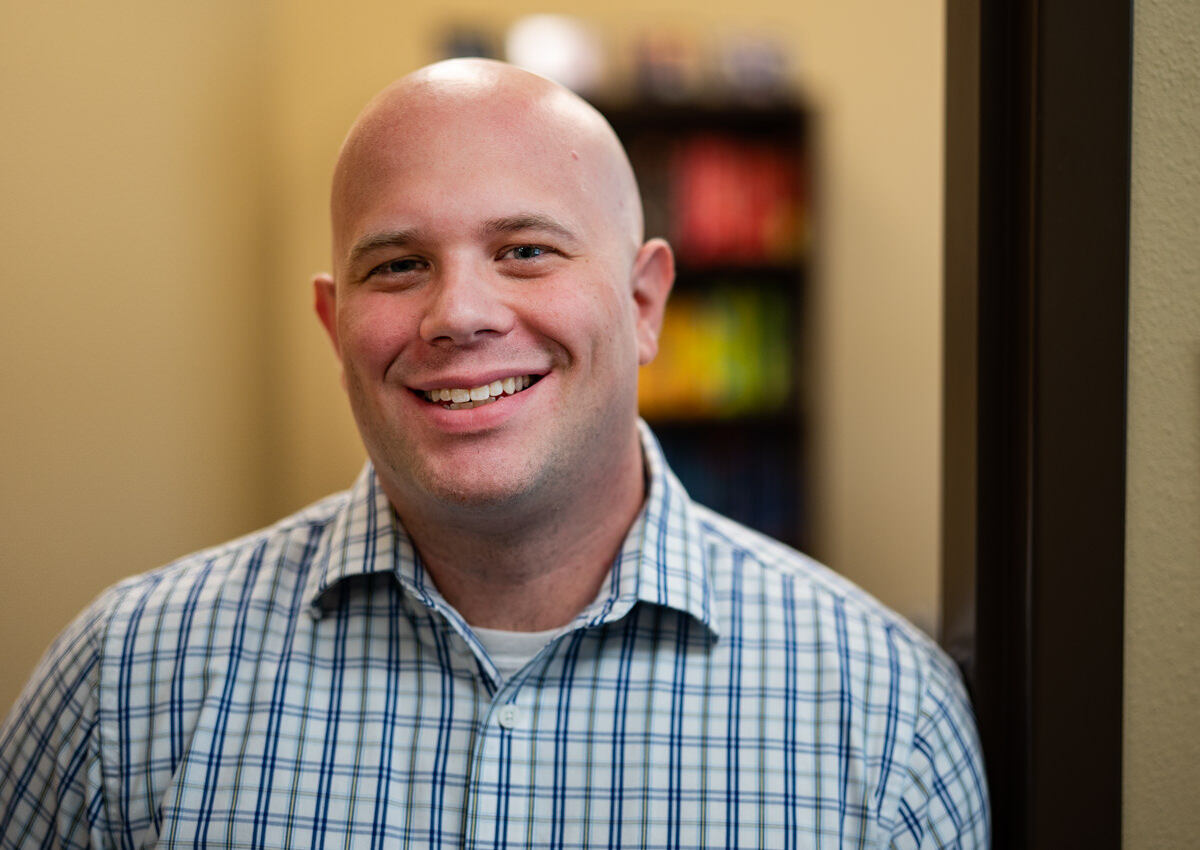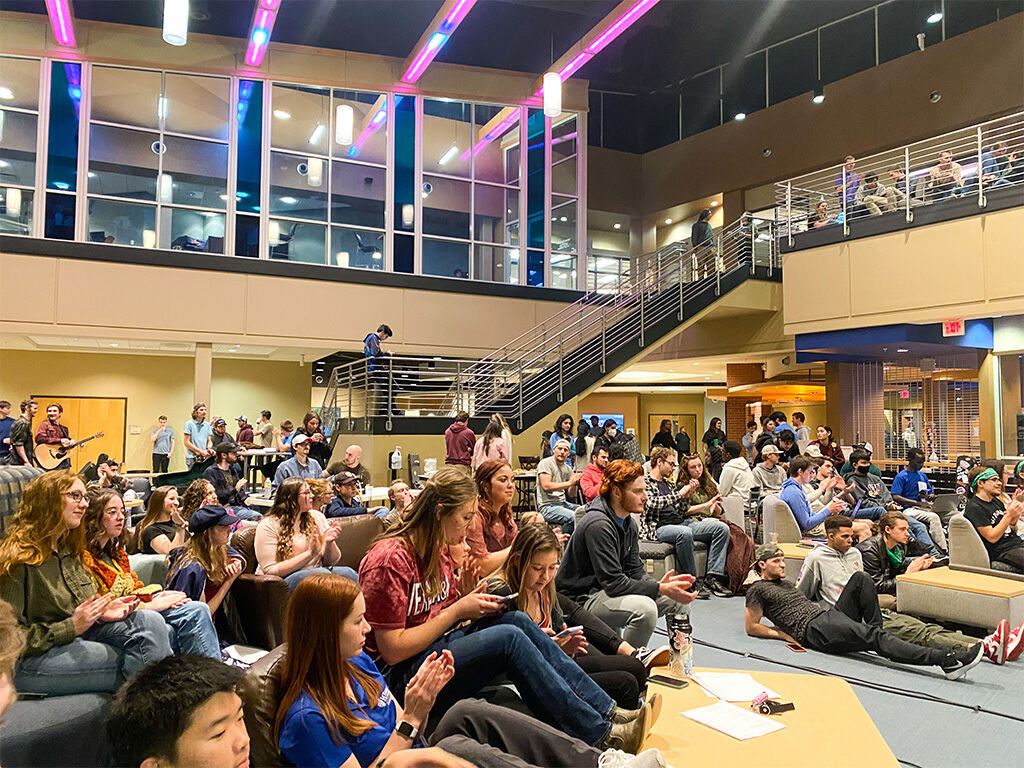by Dr. Steve Conn, Dean of Students
 One of my favorite stories in the Old Testament is the story of Hagar, the mother of Ishmael. Because Abraham and Sarah are impatient to have a child, they take matters into their own hands and Abraham has a child with Hagar. After the birth of Isaac, they cast Hagar and Ishmael out into the wilderness where they nearly die of thirst. Throughout the story, Hagar is dismissed, ignored, and unseen. She is referred to exclusively as Sarah’s slave or as “the slave girl” throughout the story, with one exception: God reveals himself to her in the desert and calls her by name. He meets her there, comforts her, and reminds her that she has been both seen and heard. An emboldened Hagar responds to God, “You are El-roi,” which roughly translates to “the God who sees me.”
One of my favorite stories in the Old Testament is the story of Hagar, the mother of Ishmael. Because Abraham and Sarah are impatient to have a child, they take matters into their own hands and Abraham has a child with Hagar. After the birth of Isaac, they cast Hagar and Ishmael out into the wilderness where they nearly die of thirst. Throughout the story, Hagar is dismissed, ignored, and unseen. She is referred to exclusively as Sarah’s slave or as “the slave girl” throughout the story, with one exception: God reveals himself to her in the desert and calls her by name. He meets her there, comforts her, and reminds her that she has been both seen and heard. An emboldened Hagar responds to God, “You are El-roi,” which roughly translates to “the God who sees me.”
Many people in modern society may feel like Hagar, although we are not slaves, and the “deserts” of our lives are metaphorical. However, it is no secret that many people are struggling today under heavy emotional and psychological burdens that leave us feeling alone, stranded in the desert, and desperate for a drink that will bring us life. In 2022, mental health has become a common topic of household conversation as a prevalence of issues like depression and anxiety have grown at an alarming pace. You don’t need to be a psychologist or a world-class researcher to examine the data around you and see that people are struggling with their mental and emotional health to an extent we have never seen before. A quick internet search, an overview of statistics from the National Institute of Mental Health, a glance at national headlines, or even a quick perusal of new bestsellers on Amazon or your local bookstore will tell you a consistent story: mental health is a rapidly growing problem.
College students are not immune to this concerning phenomenon. In fact, a report released by the National College Health Association revealed that 51% of college students reported having moderate psychological distress and 24% reported having serious psychological distress. The same study found that 22% of students have been diagnosed with depression at some point in their lives, 27% have been diagnosed with anxiety, and over 50% of students admitted to currently experiencing feelings of loneliness. These numbers paint a daunting picture of the future where succeeding in college becomes an emotional and psychological challenge almost as much as an academic one.
It’s tempting to sit back and wonder what exactly has gone wrong and how we can fix it. I think that’s a very valid question. But, I think we should be equally interested in what’s still going right with everyone and continuing to encourage it. At least, that’s the approach I learned with Dr. Laurie Schreiner and her work on thriving in college. As a graduate student at Azusa Pacific University, I studied with Dr. Schreiner and learned about thriving as a holistic measurement of student well-being.
Imagine two students walking across the stage at graduation. One is burnt out, stressed, and would describe his college experience as something he “survived.” The other is excited, engaged, and would describe college as a place where she came to life and flourished in every way. Measuring student thriving is an attempt to create the conditions that make the second student more common on our campus. And, that is something we can all agree would benefit everyone.
Thriving consists of five distinct factors: engaged learning (interest in coursework and engagement with the ideas outside of class), academic determination (engaging in practices to promote their learning), positive perspective (having a positive but realistic explanatory style), social connectedness **(connecting socially to others), and diverse citizenship (an interest in and desire to improve the community and world around them).
I believe that this ‘Thriving Construct’ is a valuable tool for students’ well-being and success in college, and much of what we do in student support and student life is an effort to help students grow and flourish in each of these areas. But, when I think about the hurt, the sadness, and the loneliness experienced by so many young people today, I reflect most often on the concept of true social connectedness.
How can we help these students engage with our campus and with each other? How can we help them feel a personal belonging in a world that grows increasingly impersonal? Like Hagar, people need to be seen. They need to be heard, known, understood, and accepted. This becomes all the more challenging as we live in a world where it is increasingly easy to remain anonymous.
At LeTourneau, we don’t back away from challenges.
Students everywhere will continue to struggle with anxiety, depression, and feelings of loneliness. Students at LeTourneau will do it in a context where they are seen, connected, and soaked in the truth of the Gospel. And, I believe those things that make LeTourneau unique may be key factors in helping students get back on track.
Please understand, I do recommend that for appropriate mental health and psychological guidance and support, the proper first step is seeking the help of professional counselors and medical providers. I do not believe that going to a Christian school will single-handedly protect students from experiencing the troubles of this life. I am also a firm believer that the community we create, and the experiences students have while at LeTourneau, can make a difference in their health and wellbeing.
Some of this is the natural result of a small campus. Our classroom sizes remain small, so professors will know their students and be available to them. Our residence halls house 75% of our students and our low student-to-Residence Director (RD) ratio ensures we can know every student by name.
But, it isn’t just the natural advantage of a small campus. A lot of intentionality goes into developing systems that help us be present and ready to step into the lives of students.
One of our systems in place requires a “check-in” with our students twice a semester as a follow-up to academic concerns. I have personally been present in many student meetings of our academic support and student mentorship programs, and while students are not always thrilled to be “checked-in on”, these meetings often can be a valuable insight into a student’s life, and at times, help he or she navigate the complexities of university systems. I had a meeting with a student who was getting straight A’s, except for an F in a macroeconomics course. As it turns out, he didn’t know he was still enrolled in macroeconomics because he thought he had already dropped it! Fortunately, we were able to help him figure it out before it made a permanent mark on his transcript.
In addition to academic check-ins, staff, faculty, and students are encouraged to submit any concerns they have about students’ behavior, wellbeing, or life circumstances. Every week, a team of staff and faculty pray over and plan responses to these concerns and find the best people to reach out to the students in need. During my time at LeTourneau, I have seen RD’s spend the night in the hospital next to a student. I have seen a staff member be the one to break the news to a student about a death in his family and then personally drive him home. I have seen faculty upholding students in prayer, love offerings taken up, students invited into homes, difficult conversation, tears, and the Holy Spirit.
I like to tell students LeTourneau is the kind of place that will come looking for you (sometimes they take this as more of a threat and less of a comfort, but I mean it in love). If you miss class for several days, your professor will notice. If you miss mealtimes, your floormates will know it. If you walk out of class crying, someone will come after you to pray with and support you. It is harder to go unseen at LeTourneau.
We are far from perfect at LETU, and I understand we will not be able to single-handedly reverse the growing trend of anxiety, depression, and loneliness that plagues our generation. However, I do believe we have advantages that other schools do not when it comes to creating healthy environments and keeping students in a community of care.
We have small sub-communities, faculty and staff who care, and a community peers and mentors who turn to God as our source of truth and comfort. We may be uniquely positioned to be leaders in the field of student care and to encourage healing and growth in students in ways that aren’t possible at other types of institutions. Much will be beyond our control at LeTourneau when it comes to student wellbeing, but our hope, and my prayer, is that we can be the people in their lives that seek them out in the same way God sought out Hagar. To be the school who sees them.

Students gather at the student center for Acousticafe - an event with coffee and musical performances by their peers.